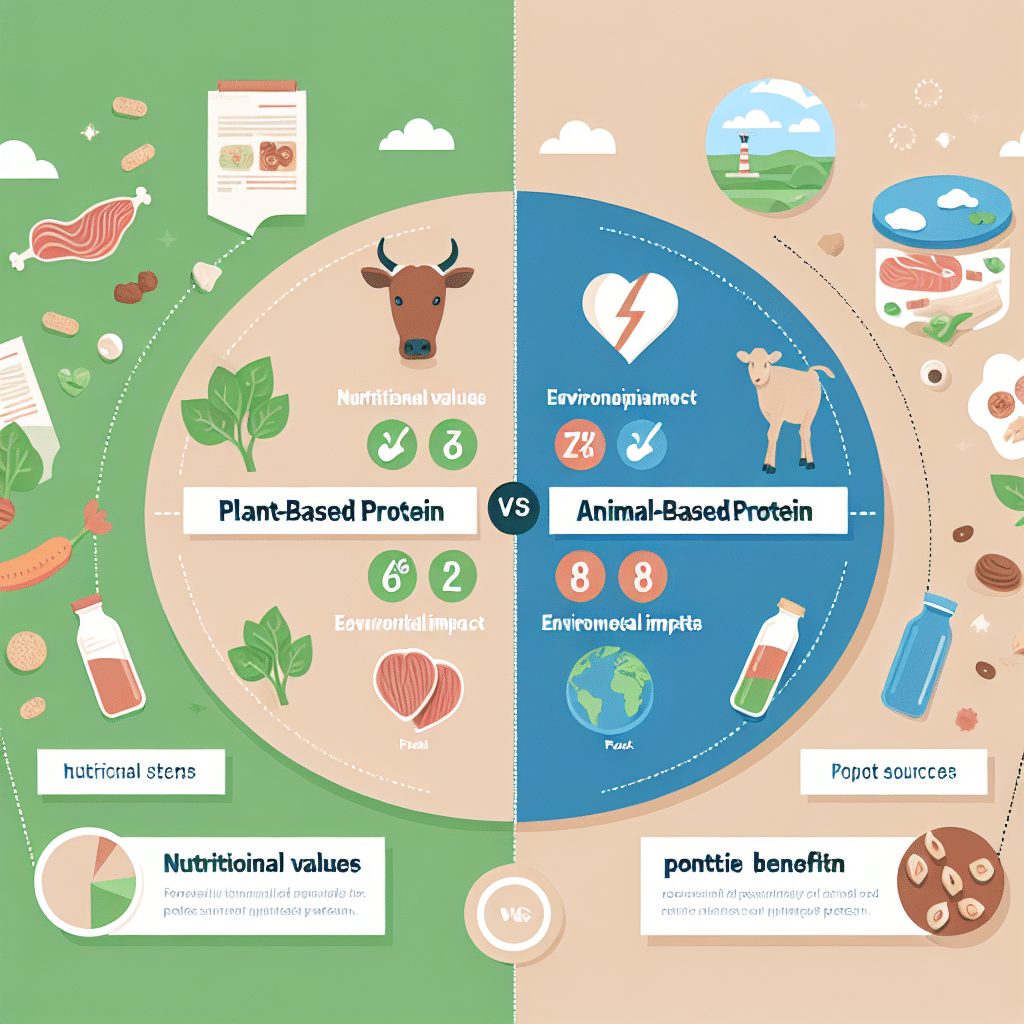Is Plant-Based Protein The Healthiest?
-
Table of Contents
- Plant-Based Protein: Is It the Healthiest Option for You?
- Understanding Plant-Based Proteins
- Nutritional Benefits of Plant-Based Proteins
- Comparing Plant-Based and Animal-Based Proteins
- Scientific Research on Plant-Based Proteins
- Case Studies: Success Stories of Plant-Based Diets
- Challenges and Considerations
- Conclusion: Making the Healthiest Choice
- ETprotein: Your Source for High-Quality Plant-Based Proteins
Plant-Based Protein: Is It the Healthiest Option for You?

Protein is a crucial macronutrient that plays a vital role in building muscle, repairing tissue, and producing enzymes and hormones. While animal-based proteins have traditionally dominated the dietary landscape, plant-based proteins are gaining popularity as a healthier and more sustainable alternative. This article delves into the health implications of plant-based proteins and examines whether they are indeed the healthiest choice.
Understanding Plant-Based Proteins
Plant-based proteins are derived from various plant sources, including legumes, grains, nuts, seeds, and vegetables. Unlike animal proteins, which contain all nine essential amino acids, most plant proteins are considered incomplete, meaning they lack one or more essential amino acids. However, by consuming a variety of plant-based protein sources, one can easily obtain a complete amino acid profile.
Nutritional Benefits of Plant-Based Proteins
Plant-based proteins offer numerous health benefits that contribute to their growing popularity:
- Lower in Saturated Fat: Plant-based proteins typically contain less saturated fat than animal proteins, which is beneficial for heart health.
- High in Fiber: Many plant proteins are also high in fiber, which aids in digestion and can help lower cholesterol levels.
- Rich in Nutrients: Plant-based protein sources often come packed with additional nutrients such as antioxidants, vitamins, and minerals.
- Environmentally Sustainable: Producing plant-based proteins generally requires less water and land and produces fewer greenhouse gases compared to animal protein production.
Comparing Plant-Based and Animal-Based Proteins
When comparing plant-based proteins to their animal-based counterparts, it’s essential to consider the complete nutritional profile. Animal proteins are known for their high biological value and complete amino acid profile. However, they can also be high in cholesterol and saturated fats, which may contribute to heart disease.
On the other hand, plant-based proteins are associated with lower risks of many chronic diseases, including cardiovascular disease, hypertension, type 2 diabetes, and certain types of cancer. This is partly due to the additional health-promoting compounds found in plants, such as phytochemicals and fiber.
Scientific Research on Plant-Based Proteins
Several studies have highlighted the benefits of plant-based diets. For instance:
- A study published in the American Journal of Epidemiology found that high animal protein intake was associated with a higher risk of death, particularly from cardiovascular disease, whereas high plant protein intake was associated with a lower risk of death.
- Research in the Journal of the American Heart Association indicated that diets higher in plant-based foods and lower in animal foods were associated with a lower risk of heart disease and death in middle-aged adults.
These studies suggest that plant-based proteins can contribute to a longer and healthier life when compared to diets high in animal-based proteins.
Case Studies: Success Stories of Plant-Based Diets
Many individuals have experienced significant health improvements by switching to a diet rich in plant-based proteins. For example, case studies have documented individuals who have successfully managed diabetes, reduced cholesterol levels, and lost weight after adopting a plant-based diet.
Challenges and Considerations
While plant-based proteins offer many health benefits, there are some challenges to consider:
- Protein Quality: It’s important to consume a variety of plant proteins to ensure a complete amino acid profile.
- Nutrient Absorption: Some plant proteins contain antinutrients that can interfere with the absorption of other nutrients.
- Caloric Density: Plant-based proteins can be less calorie-dense, which may require larger portions to meet protein needs, especially for athletes or those with high protein requirements.
Conclusion: Making the Healthiest Choice
In conclusion, plant-based proteins offer a wealth of health benefits and can be part of a balanced and nutritious diet. While they may require more careful planning to ensure a complete amino acid profile, the advantages in terms of nutrient density, lower saturated fat content, and associated health benefits make them an excellent choice for many individuals. Whether you’re looking to improve your health, reduce your environmental footprint, or simply diversify your diet, plant-based proteins are worth considering.
ETprotein: Your Source for High-Quality Plant-Based Proteins
If you’re interested in incorporating plant-based proteins into your diet, ETprotein offers a range of high-quality organic vegan protein products. Their selection includes organic rice protein, pea protein, and various seed proteins, all characterized by a neutral taste and non-GMO, allergen-free attributes. With L-(+)-Ergothioneine purity over 98%, ETprotein’s products cater to diverse industries and dietary needs. For more information or to sample their products, please contact ETprotein and email sales(at)ETprotein.com today.
About ETprotein:
ETprotein, a reputable protein and L-(+)-Ergothioneine (EGT) Chinese factory manufacturer and supplier, is renowned for producing, stocking, exporting, and delivering the highest quality organic bulk vegan proteins and L-(+)-Ergothioneine. They include Organic rice protein, clear rice protein, pea protein, clear pea protein, watermelon seed protein, pumpkin seed protein, sunflower seed protein, mung bean protein, peanut protein, and L-(+)-Ergothioneine EGT Pharmaceutical grade, L-(+)-Ergothioneine EGT food grade, L-(+)-Ergothioneine EGT cosmetic grade, L-(+)-Ergothioneine EGT reference grade and L-(+)-Ergothioneine EGT standard. Their offerings, characterized by a neutral taste, non-GMO, allergen-free attributes, with L-(+)-Ergothioneine purity over 98%, 99%, cater to a diverse range of industries. They serve nutraceutical, pharmaceutical, cosmeceutical, veterinary, as well as food and beverage finished product distributors, traders, and manufacturers across Europe, USA, Canada, Australia, Thailand, Japan, Korea, Brazil, and Chile, among others.
ETprotein specialization includes exporting and delivering tailor-made protein powder and finished nutritional supplements. Their extensive product range covers sectors like Food and Beverage, Sports Nutrition, Weight Management, Dietary Supplements, Health and Wellness Products, and Infant Formula, ensuring comprehensive solutions to meet all your protein needs.
As a trusted company by leading global food and beverage brands and Fortune 500 companies, ETprotein reinforces China’s reputation in the global arena. For more information or to sample their products, please contact them and email sales(at)ETprotein.com today.












